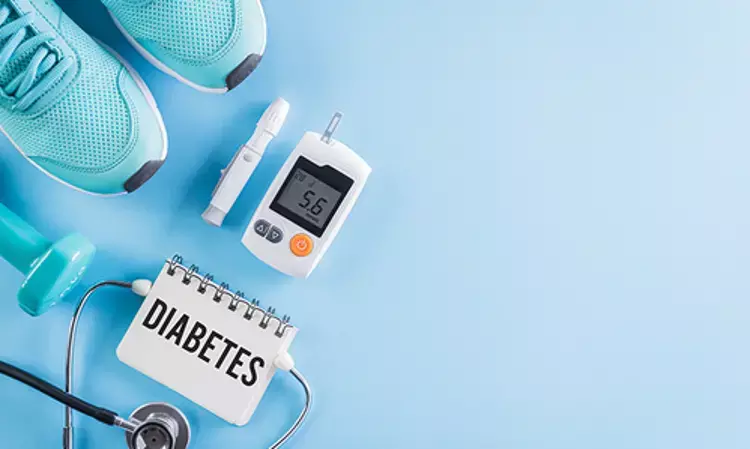- Home
- Medical news & Guidelines
- Anesthesiology
- Cardiology and CTVS
- Critical Care
- Dentistry
- Dermatology
- Diabetes and Endocrinology
- ENT
- Gastroenterology
- Medicine
- Nephrology
- Neurology
- Obstretics-Gynaecology
- Oncology
- Ophthalmology
- Orthopaedics
- Pediatrics-Neonatology
- Psychiatry
- Pulmonology
- Radiology
- Surgery
- Urology
- Laboratory Medicine
- Diet
- Nursing
- Paramedical
- Physiotherapy
- Health news
- Fact Check
- Bone Health Fact Check
- Brain Health Fact Check
- Cancer Related Fact Check
- Child Care Fact Check
- Dental and oral health fact check
- Diabetes and metabolic health fact check
- Diet and Nutrition Fact Check
- Eye and ENT Care Fact Check
- Fitness fact check
- Gut health fact check
- Heart health fact check
- Kidney health fact check
- Medical education fact check
- Men's health fact check
- Respiratory fact check
- Skin and hair care fact check
- Vaccine and Immunization fact check
- Women's health fact check
- AYUSH
- State News
- Andaman and Nicobar Islands
- Andhra Pradesh
- Arunachal Pradesh
- Assam
- Bihar
- Chandigarh
- Chattisgarh
- Dadra and Nagar Haveli
- Daman and Diu
- Delhi
- Goa
- Gujarat
- Haryana
- Himachal Pradesh
- Jammu & Kashmir
- Jharkhand
- Karnataka
- Kerala
- Ladakh
- Lakshadweep
- Madhya Pradesh
- Maharashtra
- Manipur
- Meghalaya
- Mizoram
- Nagaland
- Odisha
- Puducherry
- Punjab
- Rajasthan
- Sikkim
- Tamil Nadu
- Telangana
- Tripura
- Uttar Pradesh
- Uttrakhand
- West Bengal
- Medical Education
- Industry
Voice pitch may be of use for non-invasive glucose monitoring for people living with Type 2 diabetes: Study

As part of its ongoing exploration of vocal biomarkers and the role they can play in enhancing health outcomes, Klick Labs published a new study in Scientific Reports confirming the link between blood glucose levels and voice pitch and opening the door to future advancements in non-invasive glucose monitoring for people living with Type 2 diabetes.
In “Linear Effects of Glucose Levels on Voice Fundamental Frequency in Type 2 diabetes and Individuals with Normoglycemia,” researchers investigated how blood glucose levels influence the frequency of the voice in 505 participants across three glycemic statuses – non-diabetic, prediabetic, and Type-2 diabetic. Participants were fitted with continuous glucose monitors (CGMs) and recorded their voices multiple times daily for two weeks. The analysis revealed a linear relationship where an increase in CGM glucose levels corresponded to an increase in the fundamental frequency in the voice.
“By establishing a significant positive association between glucose levels and fundamental frequency, our study provides compelling justification for more research on using voice to predict and monitor glucose levels,” said Jaycee Kaufman, lead author and scientist at Klick Labs. “Whereas current glucose monitoring methods are often invasive and inconvenient, voice-based glucose monitoring could be as easy as talking into a smartphone, which could change the game for the estimated 463 million people around the world living with Type 2 diabetes."
Klick Labs’ latest research marks another step forward in its ongoing commitment to revolutionizing the detection and management of diabetes using voice tech and machine learning. Their October 2023 study in Mayo Clinic Proceedings: Digital Health demonstrated that voice and AI can screen for Type 2 diabetes with high accuracy. Previously, their “Screening for Impaired Glucose Homeostasis: A Novel Metric of Glycemic Control” research also appeared in Mayo Clinic Proceedings: Digital Health (May 2023), and their “Homeostasis as a proportional–integral control system” study was published in Nature Digital Medicine (May 2020).
Reference:
Kaufman, J., Jeon, J., Oreskovic, J. et al. Linear effects of glucose levels on voice fundamental frequency in type 2 diabetes and individuals with normoglycemia. Sci Rep 14, 19012 (2024). https://doi.org/10.1038/s41598-024-69620-z
Dr Kamal Kant Kohli-MBBS, DTCD- a chest specialist with more than 30 years of practice and a flair for writing clinical articles, Dr Kamal Kant Kohli joined Medical Dialogues as a Chief Editor of Medical News. Besides writing articles, as an editor, he proofreads and verifies all the medical content published on Medical Dialogues including those coming from journals, studies,medical conferences,guidelines etc. Email: drkohli@medicaldialogues.in. Contact no. 011-43720751


